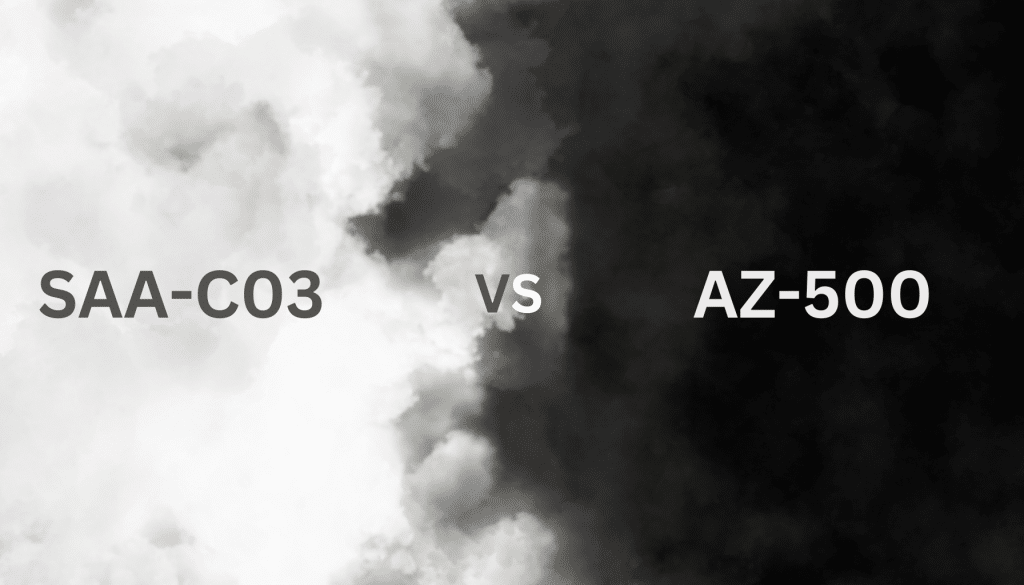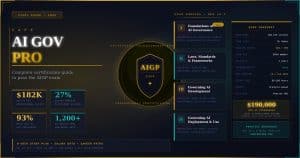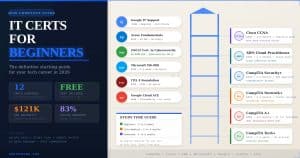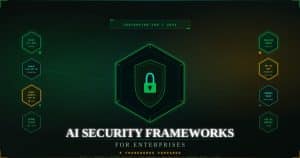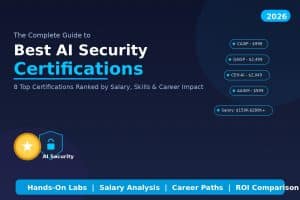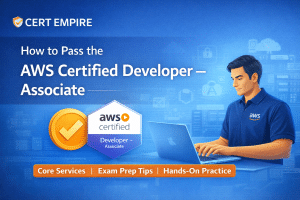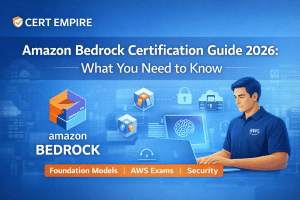Cloud security is hotter than ever, and if you’re looking to advance your career, you’ve probably come across two popular cloud computing certifications already: AWS Certified Solutions Architect – Associate (SAA-C03) and Microsoft Certified: Azure Security Engineer Associate (AZ-500). Both are excellent choices, but which one is the right fit for you?
Choosing between SAA-C03 and AZ-500 can feel overwhelming, especially when you’re trying to figure out which certification will boost your skills, job prospects, and salary the most. Whether you’re already working in cloud computing courses or security or just getting started, understanding the differences between these two certifications can help you make a smarter career move.
In this guide, we’ll break down everything you need to know: from what each certification covers to career opportunities and potential earnings. By the end, you’ll have a clear idea of which certification can help you reach your goals faster. Let’s dive in!
Comparison!
| Aspect | SAA-C03 (AWS) | AZ-500 (Azure) |
| Focus Area | Cloud Architecture | Cloud Security |
| Difficulty Level | Moderate | Hard |
| Best For | Architects, DevOps, Beginners | Security Engineers, Analysts |
| Hands-On Required? | Some | A Lot |
| Prep Time Needed | 2-3 months (avg) | 3-6 months (avg) |
| Exam Format | Multiple-choice | Multi-choice, case studies |
| Biggest Challenge | Cost vs. Security Tradeoffs | Complex security scenarios |
The Quick Take: How SAA-C03 and AZ-500 Stack Up for Cloud Security Aspirants
Cloud security jobs are booming, and certifications play a big role in standing out. Two names that pop up a lot are AWS Certified Solutions Architect – Associate (SAA-C03) and Microsoft Azure Security Engineer (AZ-500). Each one has its own strengths, and picking the right one can depend on a few things like your experience, job goals, and whether you’re more into AWS or Azure.
What’s the difference, really?
SAA-C03 is all about AWS – the biggest cloud provider out there. This cert focuses on designing cloud solutions, covering things like architecture best practices, cost efficiency, and of course, security. While it touches on security concepts, it’s more about how to build things safely in AWS, rather than digging deep into security-only topics.
On the other hand, AZ-500 is laser-focused on security in Microsoft Azure. It’s not a general cloud cert, it’s all about securing cloud workloads, managing identities, handling compliance, and responding to threats. If your goal is a career in cloud security, this one puts you in the driver’s seat to work with Azure security tools and frameworks.
For a structured breakdown of exam format, tools, and prep strategies, read the AZ-500 Certification: Azure Security Engineer Guide.
Choosing between SAA-C03 and AZ-500
If you’re already working with AWS or planning to dive into AWS-based oracle cloud infrastructure or projects, SAA-C03 makes perfect sense. It’s a solid starting point for an all-around cloud career.
If you’re leaning toward cybersecurity and want to focus on protecting cloud environments, AZ-500 is the clear winner. Azure security skills are in high demand, and this cert proves you know your stuff when it comes to securing cloud workloads.
Diving into the Clouds: AWS vs. Azure in the Security Arena
When looking at cloud security certs, it’s easy to get caught up in exam topics and study plans. But the bigger picture is the whole cloud technology ecosystem itself. Choosing between AWS Certified Solutions Architect – Associate (SAA-C03) and Microsoft Azure Security Engineer (AZ-500) isn’t just about the cert – it’s about where you work and where you want to go. AWS and Azure are the two dominant cloud platforms, and each comes with its own strengths, services, and ways of handling security.
AWS vs. Azure: Who’s Leading the Cloud Race?
AWS is the heavyweight champion of the cloud world. It’s been around longer, has more market share, and powers everything from startups to government agencies. Companies love AWS for its wide range of cloud services now, global reach, and cost flexibility.
Azure, on the other hand, has been gaining ground quickly. Its biggest selling point? Deep integration with Microsoft tools and services. Many enterprises that rely on Windows, Active Directory, and Microsoft 365 naturally lean towards Azure because it blends so well with their existing setup.
If you’re already working in an AWS-heavy environment, going for SAA-C03 makes sense. If your company is deeply tied to Microsoft products, Azure (and AZ-500) is likely the smarter choice.
Security in AWS vs. Azure – What’s the Approach?
AWS and Azure both take cloud security seriously, but they do it differently.
- AWS Security: AWS follows the “shared responsibility model,” meaning they secure the cloud infrastructure, but customers must secure their own workloads. AWS offers tools like IAM (Identity and Access Management), Security Hub, and GuardDuty to monitor and protect resources. Security is baked into their design principles, but it’s up to you to configure things correctly.
- Azure Security: Azure, on the other hand, has a strong focus on compliance and regulatory support. It offers built-in security features such as Azure Security Center, Microsoft Defender for Cloud, and Sentinel, which are designed to work seamlessly with existing Microsoft solutions. If your organization is focused on meeting strict compliance standards, Azure makes it easier to stay in check.
When it comes to security, AWS gives you more control, while Azure provides more automation and compliance-focused features.
To prepare smarter, follow our How to Pass AZ-500 Exam: Study Tips & Prep Guide, packed with practical strategies.
SAA-C03 vs. AZ-500: Tied to the Cloud Ecosystem
Your decision between these two certs should mostly depend on which cloud your organization uses or which cloud you’re planning to work with. Certifications aren’t just about learning skills; they’re about proving you’re valuable in a specific environment.
If you’re dealing with an AWS-based company, getting certified in Azure security won’t be much help. And the same applies the other way around. Companies hiring for AWS roles are looking for AWS certs, while Azure-heavy workplaces want people certified in Microsoft security tools.
Here’s a simple way to look at it:
- Go for SAA-C03 if:
- Your workplace runs AWS or plans to migrate to AWS.
- You want to become a cloud architect with security know-how.
- You’re more interested in the “building” side of cloud solutions.
- Go for AZ-500 if:
- You’re in a Microsoft-heavy environment (think Windows, Office, Azure AD).
- Your goal is to specialize in cloud security rather than general cloud architecture.
- You enjoy working with security tools and compliance frameworks.
Exploring SAA-C03: The Path for AWS Security Professionals
AWS is everywhere, and businesses of all sizes are adopting it to scale faster and stay competitive. That means cloud professionals with AWS skills are in high demand. The AWS Certified Solutions Architect – Associate (SAA-C03) certification is one of the most popular choices for those looking to get started or advance their cloud careers, especially with a security-focused mindset. For a full breakdown of the exam, including key topics, study tips, and career insights, check out AWS SAA-C03 Certification Exam Guide: https://certempire.com/saa-c03-certification-exam-guide/
But SAA-C03 isn’t just about ticking off a certification box; it’s about understanding how AWS works and how to build secure, reliable, and cost-effective cloud solutions. If you’re considering it, here’s what you need to know.
What SAA-C03 Covers: Beyond Just the Basics
At its core, SAA-C03 focuses on designing AWS solutions that are scalable and secure. While it’s an entry-level architect cert, it dives into key areas that are critical for building a strong cloud security foundation.
The exam covers:
- Security, Identity, and Compliance – Understanding AWS security services like IAM (Identity and Access Management), KMS (Key Management Service), and security groups. You’ll learn how to manage permissions, encryption, and compliance frameworks in the cloud.
- Resilient Architectures – Designing systems that can handle failures, with a focus on availability and fault tolerance using services like EC2, S3, and load balancers.
- High-Performance Architectures – Optimizing AWS resources for performance while ensuring data security and efficiency.
- Cost Optimization Strategies – Balancing performance with cost efficiency, ensuring businesses get the most value without compromising security.
- Operational Excellence – Monitoring workloads and implementing best practices for operational efficiency and continuous improvement.
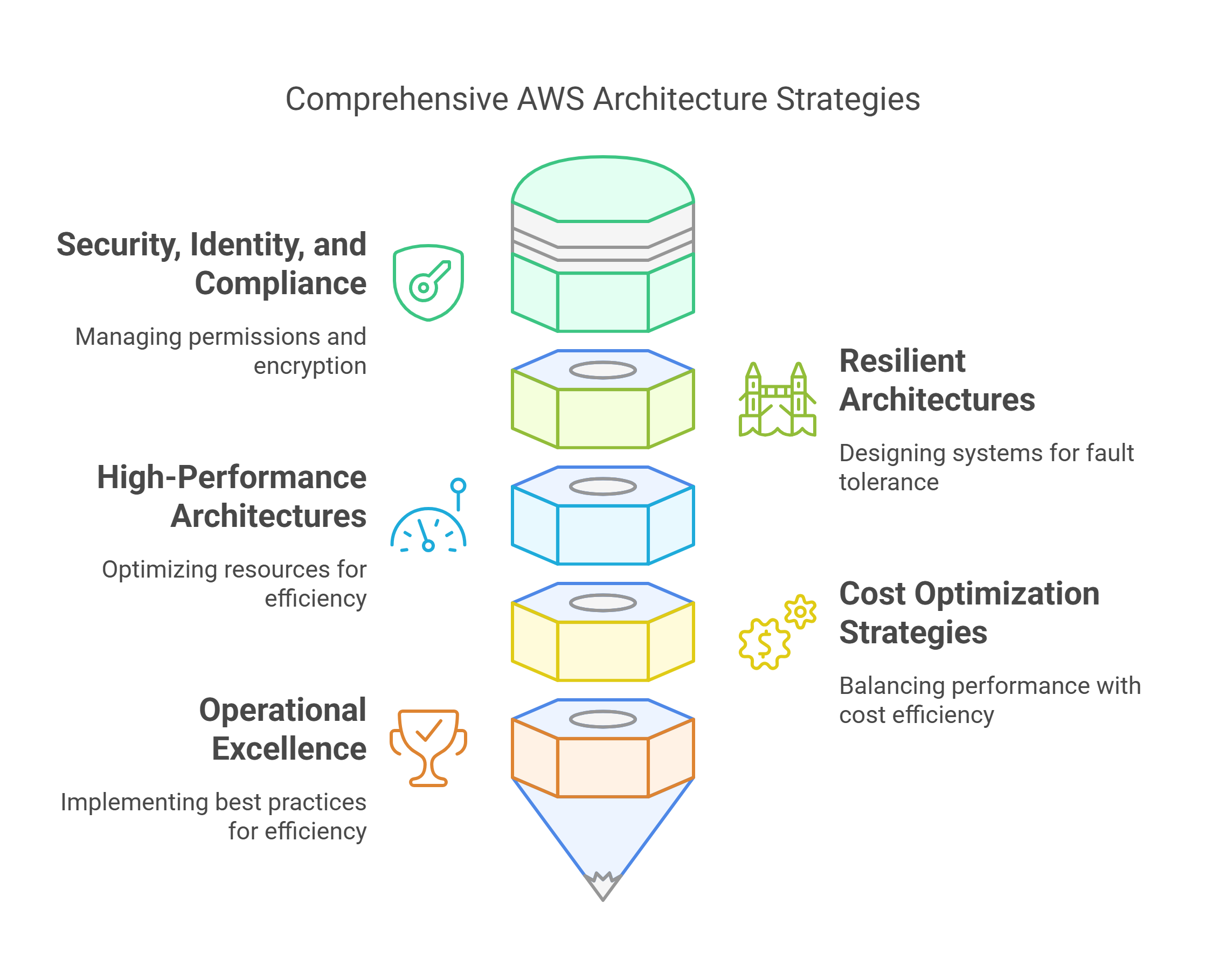
While the cert doesn’t focus entirely on security, security best practices are woven into almost every topic, making it a great starting point for anyone looking to step into AWS security roles.
Ideal Candidates: Who Should Pursue SAA-C03?
SAA-C03 is a versatile certification, but it’s not for everyone. It’s best suited for:
- Cloud Newbies – If you’re new to AWS but have a general IT background, this cert gives you a structured way to learn AWS and build practical skills.
- IT Professionals Moving to Cloud Roles – System admins, developers, and network engineers looking to transition to cloud roles will benefit from the cert’s broad coverage.
- Security Professionals Expanding to Cloud – If you already have a cybersecurity background but want to understand how security works in AWS, this cert lays a strong foundation.
- Aspiring Cloud Architects – For those who want to design AWS solutions and understand the key principles behind cloud security and scalability.
- AWS Enthusiasts Wanting Proof of Skills – Even if you’re self-taught in AWS, having the cert can validate your knowledge and make you stand out in job applications.
If you’re someone who’s deeply into penetration testing, threat hunting, or hands-on cloud security operations, SAA-C03 might not be deep enough. In that case, looking at security-specific AWS certs like AWS Security Specialty would be a better fit.
Key Skills Acquired Through SAA-C03
By the time you pass the SAA-C03 exam, you’ll have a solid grasp of how AWS works and how to build solutions securely. Some of the critical skills you’ll walk away with include:
- Understanding AWS Security Best Practices – You’ll know how to apply AWS security principles to design cloud workloads that are resilient and protected from threats.
- Implementing Identity and Access Controls – Managing users, groups, and permissions with AWS IAM to ensure the right level of access without exposing sensitive data.
- Data Encryption and Protection – Using AWS security services to encrypt data at rest and in transit, securing critical business assets.
- Networking Knowledge – Designing secure VPCs (Virtual Private Clouds), setting up subnets, and using security groups to control traffic flow.
- Automation and Scalability – Learning how to use services like AWS Auto Scaling and Elastic Load Balancing to ensure security and performance as workloads grow.
- Monitoring and Incident Response – Leveraging AWS tools like CloudWatch and CloudTrail to monitor activity and respond to potential security threats.
- Cost-Security Balance – Mastering the art of keeping cloud costs in check while maintaining robust security measures.
Why SAA-C03 Is a Solid Starting Point for AWS Security Roles
Even though it’s not a dedicated security cert, SAA-C03 helps you understand how security fits into the bigger picture. Once you’ve got it under your belt, it becomes easier to dive deeper into AWS security services and take on more specialized roles.
If you’re serious about a career in AWS security, consider pairing SAA-C03 with:
- AWS Security Specialty – A more advanced cert that covers cloud security in-depth.
- Certified Cloud Security Professional (CCSP) – A vendor-neutral cert that focuses on securing cloud environments across multiple platforms.
- Hands-on AWS Security Experience – Certifications are great, but real-world hands-on practice will always be the most valuable.
Is SAA-C03 Right for You?
If you’re aiming to work in AWS environments and want a broad understanding of how cloud security fits into cloud architecture, then yes, SAA-C03 is worth pursuing. However, if you’re laser-focused on cybersecurity, you might want to explore other options down the line.
Either way, SAA-C03 is a valuable cert that opens doors and lays the foundation for more specialized cloud and network security and certifications.
AZ-500: The Specialist’s Certification for Azure Security
If you’re serious about cloud security in Microsoft Azure, the AZ-500: Microsoft Certified Azure Security Engineer Associate certification is a direct path to mastering the security aspects of Azure. Unlike general cloud certs, AZ-500 is training course laser-focused on protecting Azure environments, securing data, managing identities, and responding to security incidents.
Whether you’re already working in an Azure-heavy environment or looking to specialize in cloud security, this cert proves you’ve got the skills to handle real-world security challenges in Microsoft’s cloud platform. For a structured guide on AZ-500, including its exam format, security tools, and preparation strategies, read AZ-500 Certification Guide
How AZ-500 Focuses on Azure’s Security Framework
Azure’s cloud security architecture is built around identity, access control, data protection, and compliance. The AZ-500 certification dives deep into these areas, equipping you with the knowledge and practical skills to protect cloud workloads effectively.
The cert covers:
- Identity and Access Management (IAM): Master Azure AD (Active Directory), Conditional Access policies, Privileged Identity Management (PIM), and multi-factor authentication (MFA) to ensure only the right users have access to critical resources.
- Platform Protection: Secure Azure virtual machines, implement endpoint security solutions, configure Azure Firewall, and leverage built-in protections like Just-In-Time (JIT) VM access.
- Data Security: Learn how to implement encryption, protect sensitive data with Azure Key Vault, and manage compliance using data classification and regulatory controls.
- Security Operations: Gain skills in threat detection using Microsoft Defender for Cloud, Sentinel (SIEM), and Azure Security Center to monitor and respond to security incidents.
- Compliance and Governance: Ensure cloud environments meet industry regulations and follow best practices by using tools like Azure Policy and Security Compliance Manager.
For a deeper look at career opportunities and pay scales, explore Job Roles and Salary Insights for AZ-500 Certified.
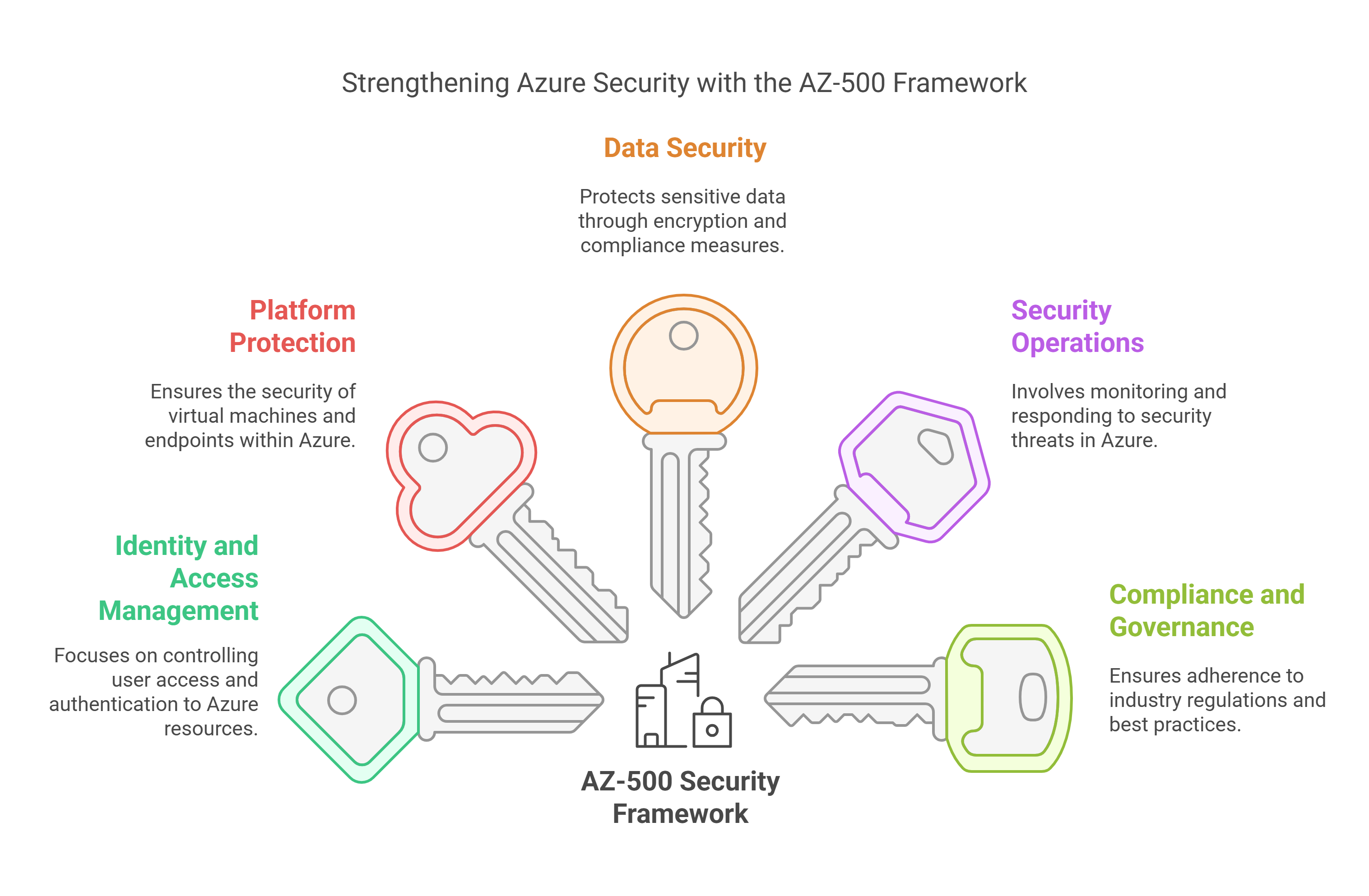
AZ-500 doesn’t just cover theoretical concepts. It pushes you to work with Azure’s security toolset in practical scenarios, so you’ll be ready to implement and manage security solutions in real-world cloud environments.
Advanced Skills and Tools You’ll Master with AZ-500
Unlike broad cloud certifications, AZ-500 hones in on specialized application security tools and frameworks that Azure professionals use daily. By the time you complete the cert, you’ll have hands-on knowledge of:
- Azure Active Directory (AAD): Implementing identity governance, managing hybrid identity scenarios, and using Azure AD B2C for customer identity solutions.
- Microsoft Defender for Cloud: Configuring threat detection, monitoring workloads across hybrid and multi-cloud environments, and automating security alerts.
- Azure Security Center: Understanding security posture management, compliance assessments, and workload protection across cloud and on-prem environments.
- Sentinel (SIEM/SOAR): Setting up a cloud-native SIEM to detect and respond to threats across Azure, on-prem, and multi-cloud workloads.
- Azure Key Vault: Securing application secrets, certificates, and cryptographic keys to ensure data protection in the cloud.
- Role-Based Access Control (RBAC): Enforcing least privilege access across Azure resources to minimize security risks.
- Advanced Threat Protection (ATP): Detecting vulnerabilities in Azure SQL databases, storage accounts, and other resources.
When and Why to Pick This Certification
If you’re considering AZ-500, you need to ask yourself a few things:
- Are you working with Microsoft environments? If your job or target role involves Azure, Active Directory, or Microsoft security tools, AZ-500 is a no-brainer.
- Do you want to specialize in security? Unlike other Azure certs that cover a broad range of topics, this one is all about security, making it ideal for those looking to specialize.
- Are you planning to work in enterprise environments? Many large organizations rely on Azure for their cloud infrastructure. Having an AZ-500 cert makes you a valuable asset in enterprise security teams.
- Are compliance and governance important to you? If your job involves regulatory compliance, AZ-500 will help you understand Azure’s built-in compliance features and frameworks.
You should pick AZ-500 if:
- You’re aiming for roles like Cloud Security Engineer, Security Consultant, or SOC Analyst with an Azure focus.
- Your company or clients use Microsoft technologies, and you want to stay aligned with their cloud security needs.
- You’re looking to move into specialized cybersecurity roles rather than general cloud administration.
On the flip side, if you’re just getting started with cloud security, AZ-500 might feel overwhelming. In that case, it’s better to build a foundational understanding with Azure Fundamentals (AZ-900) or Associate-level Azure certs before jumping into professional cloud security engineer specialization.
How Difficult Are SAA-C03 and AZ-500? A Realistic Viewpoint
When you’re planning to get certified, one of the first things you’ll wonder is, “How hard is this going to be?” The difficulty of a certification exam isn’t just about the number of topics it covers – it’s also about how much real-world experience you need, the complexity of the questions, and how well you understand the cloud platform.
Let’s break down the difficulty levels of the SAA-C03 (AWS Certified Solutions Architect – Associate) and AZ-500 (Microsoft Certified: Azure Security Engineer Associate) exams so you know what to expect before diving in.
SAA-C03: Testing Knowledge vs. Experience
The SAA-C03 exam is designed for individuals who want to understand how to architect cloud solutions using AWS services. It tests your ability to design secure, scalable, and cost-effective architectures, but it doesn’t demand deep hands-on experience in every AWS service. Instead, it focuses on concepts, best practices, and theoretical knowledge.
What Makes SAA-C03 Manageable?
- Conceptual Focus: Many of the questions test your understanding of AWS services and how they fit together to form a secure and reliable architecture.
- Multiple-Choice Format: Most questions have clear options, making it possible to eliminate incorrect answers if you have a solid grasp of AWS concepts.
- Plenty of Study Resources: There are tons of online courses, practice exams, and study guides that cover the exact topics you’ll face in the exam.
Where It Gets Tricky
- Scenario-Based Questions: AWS loves throwing real-world scenarios at you. You’ll need to choose the best combination of services to solve a problem, and sometimes multiple answers seem correct.
- Cost Optimization vs. Performance: Some questions will force you to balance cost efficiency with security and performance, which can be tough without hands-on experience.
- Security Considerations: While it’s not a security-focused exam, SAA-C03 includes questions on identity and access management, encryption, and compliance – areas where many struggle.
Difficulty Rating:
If you have basic AWS knowledge and 6-12 months of experience working with cloud solutions, the SAA-C03 exam is moderate in difficulty. It’s a great starting point, but it requires preparation. Expect to spend at least 2-3 months studying, even if you work with AWS regularly.
If you’re entirely new to cloud computing, expect a steep learning curve, and you might need more study time and hands-on practice.
To get familiar with real exam scenarios and AWS-style questions, practicing with SAA-C03 exam dumps can significantly improve your confidence and time management during the test.
AZ-500: Hands-On Expertise Required for Success
AZ-500, on the other hand, is a security specialist certification that goes deep into Azure’s security framework, compliance features, and protection mechanisms. Unlike SAA-C03, AZ-500 is not about high-level architecture but instead focuses on practical security implementations across Azure services.
Why AZ-500 Is Tougher?
- Technical Depth: It requires an understanding of complex security operations like identity protection, encryption, firewall configurations, and compliance tools.
- Hands-On Skills Matter: Unlike AWS certs that can be passed with solid theoretical knowledge, AZ-500 demands practical knowledge of Azure services like Sentinel, Defender, and Security Center.
- Microsoft’s Unique Approach: Azure security services often integrate deeply with other Microsoft products like Office 365, Windows Server, and Active Directory. If you’re not used to Microsoft’s ecosystem, expect a learning curve.
Challenging Areas in AZ-500
- Hybrid and Multi-Cloud Security: Questions often include scenarios that involve on-premises and multi-cloud security, requiring you to understand how Azure integrates with other platforms.
- Compliance and Governance: Microsoft places heavy emphasis on compliance frameworks like GDPR, HIPAA, and ISO standards, which can be complex to grasp if you’re not familiar with them.
- Incident Response and Threat Detection: Expect questions around setting up threat detection, responding to incidents, and automating security responses. This requires experience in using tools like Sentinel (SIEM) and Defender for Cloud.
If you’re preparing for AZ-500, using AZ-500 exam dumps can help you test your knowledge on real-world security scenarios and Azure’s security toolset.
Which One Should You Choose Based on Difficulty?
- Go for SAA-C03 if:
- You’re new to cloud security and want a solid AWS foundation.
- You prefer designing systems rather than focusing purely on security operations.
- You don’t have deep experience but are willing to put in the study hours.
- Choose AZ-500 if:
- You’re already working with Azure and want to specialize in security.
- You have a background in cybersecurity and want to focus on cloud.
- You enjoy working hands-on with security tools rather than broad cloud concepts.
Preparing for these exams requires the right study resources. Many professionals rely on Cert Empire for high-quality exam dumps that reflect real exam scenarios and help reinforce key concepts.
Salary Insights: Which Certification Opens Bigger Doors?
When choosing between the AWS Certified Solutions Architect – Associate (SAA-C03) and the Microsoft Certified: Azure Security Engineer Associate (AZ-500) certifications, understanding their impact on potential earnings and job market demand is crucial. Let’s delve into the salary prospects and industry trends associated with each certification.
Comparing Potential Earnings for SAA-C03 and AZ-500 Holders
AWS Certified Solutions Architect – Associate (SAA-C03):
- Average Salary: Professionals holding the AWS Solutions Architect Associate certification can expect an average salary of approximately $136,232 per year in the United States.
- Salary Range: Salaries typically range from $132,500 to $180,000 annually, with top earners making up to $200,000 per year.
Microsoft Certified: Azure Security Engineer Associate (AZ-500):
- Average Salary: Azure Security Engineers in the United States earn an average base salary of around $105,630 per year.
- Salary Range: Entry-level positions start at approximately $124,967 per year, while experienced professionals can earn up to $171,886 annually.
Industry Demand Trends for AWS and Azure Professionals
AWS Professionals:
- Market Share: AWS continues to dominate the cloud market, maintaining a significant share globally.
- Job Opportunities: The demand for AWS-certified professionals remains robust, with a wide range of roles available across various industries.
Azure Professionals:
- Growth Trajectory: Microsoft Azure has been experiencing rapid growth, with increasing adoption among enterprises, particularly those already utilizing Microsoft products.
- Specialized Roles: The rise in cloud security concerns has led to a growing demand for Azure Security Engineers, making the AZ-500 certification particularly valuable.
Conclusion!
Both certifications offer substantial earning potential and are highly regarded in the industry. The choice between SAA-C03 and AZ-500 should align with your career goals, the specific cloud platforms you aim to work with, and your interest in general cloud architecture versus specialized security roles.
FAQs: Common Questions About SAA-C03 and AZ-500
Which is better for beginners, SAA-C03 or AZ-500?
SAA-C03 is better for beginners as it covers broader cloud concepts and requires less hands-on cloud security knowledge and experience compared to the highly specialized AZ-500.
Can I switch between AWS and Azure after certification?
Yes, cloud skills are transferable, but switching requires learning platform-specific tools and services since AWS and Azure operate differently.
What are the costs and time commitments for each certification?
SAA-C03 costs around $150 and takes 2-3 months to prepare, while AZ-500 costs about $165 and typically requires 3-6 months of focused study.
Do SAA-C03 and AZ-500 require prior cloud experience?
SAA-C03 is beginner-friendly and doesn’t require prior experience, whereas AZ-500 benefits those with existing Azure or IT security knowledge.
Is AZ-500 a better choice for cybersecurity professionals?
Yes, AZ-500 is ideal for cybersecurity professionals looking to specialize in cloud security, focusing on threat protection, compliance, and identity management in Azure.

